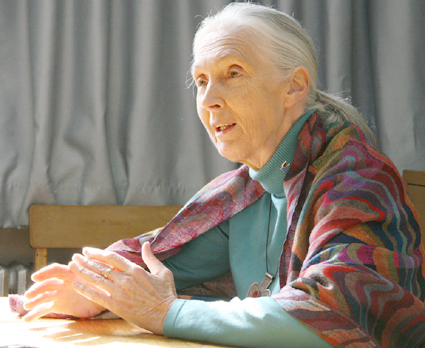
Jane Goodall, a famous primatologist especially known for her study of chimpanzees, visited Ewha from November 15 to 16 to promote her Roots & Shoots program by delivering lectures in Ewha.
Goodall was scheduled to deliver a lecture titled, “Reason for hope” at the Kim Young-Yi Hall on November 16. However, she surprised and excited students by showing up without notice on November 15, the first day of her visit, to give ten-minute lectures to three liberal arts classes. Goodall began her talks with a loud chimpanzee sound of greeting. She explained that the purpose of the Roots & Shoots program, which was established in 1991, is to empower and inspire youths from preschool to university to take action to improve the world environment through projects that promote concern for animals, the environment, and the human community.
“By spreading what we have learned and experienced throughout the program to our loved ones, we can really make a change in the environment, like a weak shoot can push through a wall and sprout its small bud in the sun,” said Goodall.
For Goodall’s main lecture, Professor Choi Jae-chun (EcoScience) briefly introduced the speaker; then Goodall greeted the audience of nearly 600 with the same hooting cry of a chimpanzee in her charismatic way, enchanting everyone in the hall.
Goodall reminisced about her younger life: how she started studying chimpanzees and how she met three very important mentors, her mother; Louis Ricky, who gave her the first opportunity to go
Looking back on 47 years of studying chimpanzees, Goodall said she found how similar chimpanzees were to human beings. Chimpanzees’ DNA is really similar to that of a human, and they also feel and express diverse emotions such as happiness, anger, sadness, and excitement just like human beings. Chimpanzees have similar life spans, about 60 years like men and, quite surprisingly, said Goodall, their earlier experience is one of the critical factors affecting their adult behavior. For example, if a baby chimpanzee is brought up under a loving, supportive, and protective — yet not too protective — mother, it will have a strong self-consciousness and have a healthy relationship with other chimpanzees when it becomes grown up. However, if it is brought up under a bad mother, it will likely become violent and isolated. Like human beings, chimpanzees also communicate with others by making many different sounds and gestures.
“But, then, what makes us humans different from chimpanzees? At some point, we developed a spoken language which can express things which are not present. Furthermore, people developed writing skills and are capable of electronic communication so that we can record history, imagine a distant future, and have discussions about more general ideas. This all brought us the responsibility of domination over other animals and the earth,” said Goodall.
Goodall’s most important message was that every person can actually make a personal difference to the world environment in this daunting era of global warming, social inequity, vanishing forests, and spreading deserts. Alluding to humankind’s destruction of the planet, she stated, “I’ve seen so many young people who have lost hope. They are apathetic, bitter, angry and even violent, because they feel the older generation has taken their future away from them. And it’s true.” However, Goodall said, she had four reasons to hope that change could still come. She said, “The first reason is the young people around the world who have passion, energy, devotion and courage once they realize that they can change the world. The second reason is our extraordinary human brain which has even invented so many powerful things, such as the Internet. The third reason is the amazing resilience of nature, and the fourth is the indomitable human spirit and the will to not give up under any circumstances.”
“I strongly believe that hundreds and thousands of young people around the world, like roots and shoots, can break through this wall of environmental crisis. Hope for the future lies in our hands. So, let’s take action.”

